Sound insulation testing is used to measure the resistance of sound provided by an element of a building (such as a floor or wall) between dwellings. It essentially measures the effectiveness of the sound proofing treatment installed as part of a build or property development. The Building Regulations Approved Document E (ADE) states all new dwellings and renovated constructions should undergo sound testing.
As many contractors and developers have found to their detriment, without a sound insulation certificate, the Building Control Officer will not issue a completion certificate. Because we understand how the sound insulation certificate affects your building project, we ensure that you get it as quickly as possible after the test. We pride ourselves on the facts that our sound insulation certificates are issued with speed and efficiency.
AF Acoustics’ competent and well-trained engineers, who will be available for testing, can even let you know the verbal results of your sound test. You will receive a written report in the space of a working day.
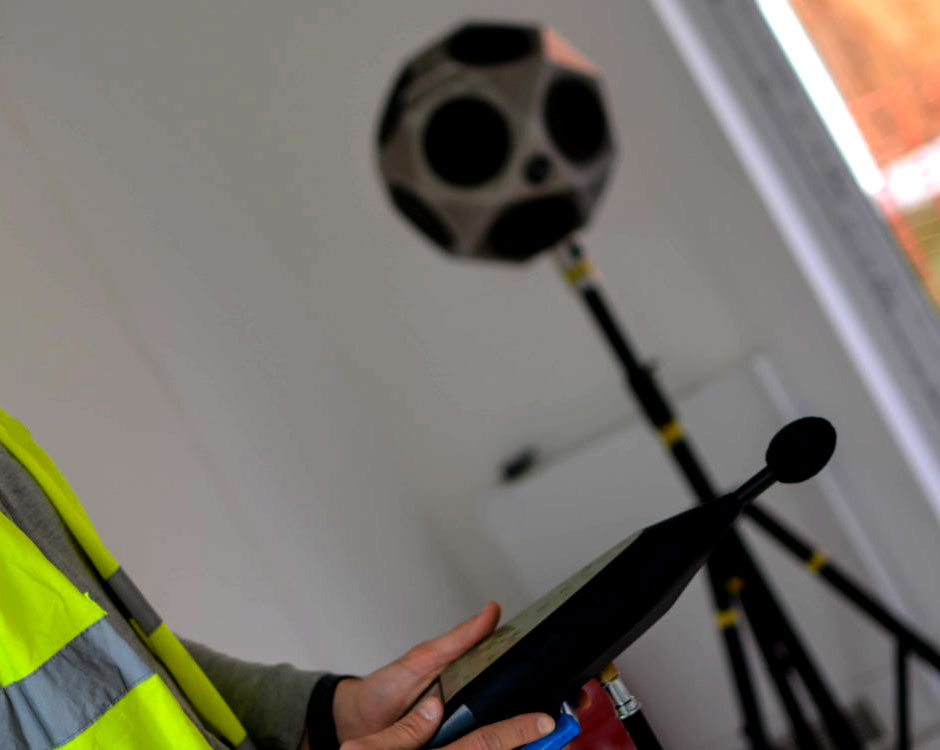
Our Guarantee
- Over 15 years experience
- State of the art equiptment
- Onsite Support
- Next Day Report Turn Around
What Sound Testing Does
Walls and floors that separate dwellings in a building are expected to be sound tested, as mandated by Document E of Building Regulations. Only dwellings that have used Robust Details, which licensed before the installation, are exempted from the test. Sound insulation tests examine airborne and impact sound moving between separating walls and floors. The tests include party walls and floors between structures or between spaces within a new development.
What is involved in Sound Insulation Testing
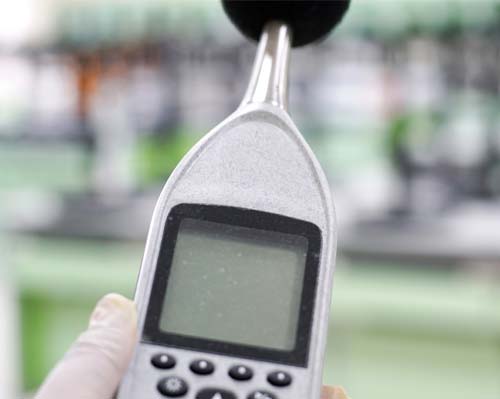
While producing lots of noise, sound test needs a quiet site to be conducted efficiently. Due to this fact, the workers in the site should not be present at the time of the test. The way a sound test is administered depends on the size and type of building and the development’s condition. Generally, a sound insulation test takes about 90 minutes for a simple, regular sized project.
Once it is completed, the engineers will give a verbal interim result on the site and basic helpful information on what was noticed during the test, e.g. possible sound issues and future places that could cause problems.
A full report and individual sound test certificates can be generated and sent out the next day. The sound testing regime is set out in the Approved Document E of the Building Regulations. It states that one set of tests is required for every 10 units in a group or sub-group. Sub-groups are defined in Section 1 of Approved Document E (ADE). ADE also states the categories of developments that should be tested. There are three: rooms, flats and houses (including bungalows) that are lived in. Examples are student accommodation, hotel rooms and care homes. The volume of testing carried out on each group is written below.
Why Should Your Dwelling Undergo Sound Testing
Document E of Building regulations, from 2003, made it compulsory for all new UK constructions to undertake a pre-completion sound test. 62dB L’nTw or less impact sound and 45dB DnTw+Ctr or higher airborne sound insulation is the required result. These result limits were put in to create and maintain a uniform standard for sound resistance in different parts of a dwelling and between adjacent buildings. Testing for sound insulation is vital because sound influences how we live in the office, while relaxing or in the house. Restricting the sound that moves between floors and walls could result in a more relaxed and better surrounding.
Sound insulation and speech privacy are critical for a variety of reasons. Inadequate sound insulation can be extremely distressing to those affected by it. It would mean noise moving from one flat to another in a block of flats. If, for example, an occupant works at night and happens to hear loud music from a neighbour upstairs on a weekend night, it would be very discomforting. Sound insulation helps improve the quality of a person’s life in diverse ways. In a structure with flats for mixed purposes, a sound insulation test will make sure that there is maximum sound resistance from party walls and floors and less noise.
How Do I Know if I Need a Sound Test?
If you’re doing one of the following, then you need a sound test:
- Constructing a building that has two or more units
- Constructing a nursing home or rooms that will be lived in, e.g. hotel room or hostel
- Converting a single development to flats
- Using designs where Robust Details are not included
Sound insulation is covered and made mandatory under Approved Document E of The Building Regulations.
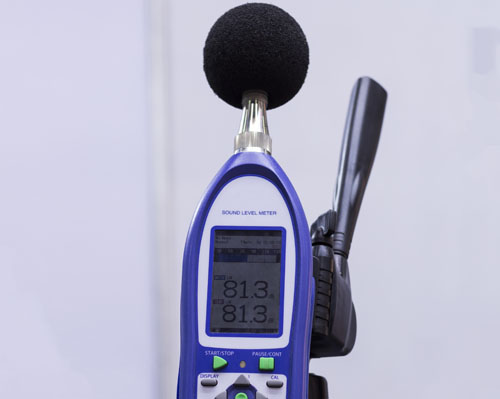
There are 2 ways you can comply. Test for sound insulation using the method of Approved Document E or use Robust Details in your development. Robust Details are a set of specific design details for walls and floors that have been previously tested to show compliance and must be used if this route is selected. You also cannot expand or tweak the design from the Robust Detail Approved listing. However, you are exempt from the sound test. Sound insulation testing is a more flexible approach. You can pick from a plethora of designs, as opposed to Robust Details. Sound insulation testing can also help architects enhance their building design and in turn the sound insulation of the building.
How Much Will I Pay for a Sound Insulation Test?
Simply contact us and we will be able to provide a free, no obligation quotation as to the requirements and costs for your development. Not only are we highly experienced in providing sound testing services in UK, our reports and certificates get to the client within one of the fastest turnaround time and our prices are competitive. Send us a price you got that’s better than our and we will try to beat it.
Ideal Period for a Sound Insulation Test
A sound test is usually conducted just before the construction is completed, and when all the doors and windows have been fixed. However, we can test your building earlier to check for problems. During the test, you should provide the following:
- Access to all rooms. The only exception is if a schedule was created before the test time.
- 240V power supply
- A noiseless site
The Procedures of a Sound Insulation Test
Our sound test engineers can answer your questions and make the sound test process easy to understand on site, during the time of the test. Airborne tests are conducted on party walls while impact and airborne tests are conducted on party floors.
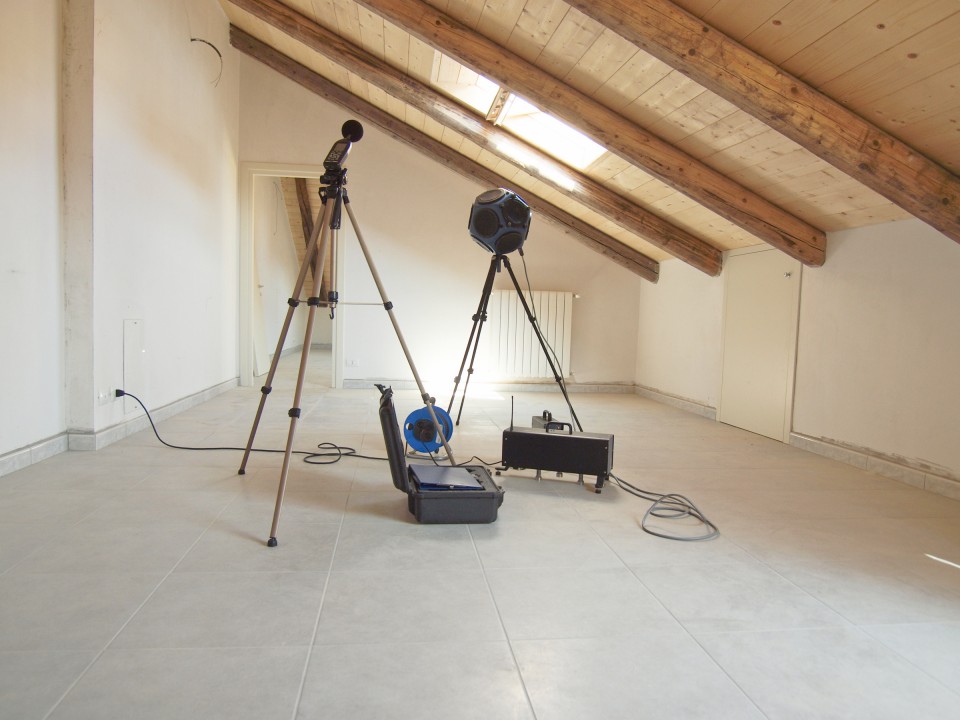
The source sound is produced with a white or pink noise generator with a dodecahedron speaker in the largest room. A sound level meter is then used to take noise measurements within the source room and the receiver room. Background sound is also calculated. Noise in the receiver room should be 10dB more than the background noise at all frequency measurements, so source noise is set to be greater than background noise. When conducting airborne sound insulation tests, two speakers are placed in each source room. The noise level in the receiving room is measured to get the sound difference between the source and receiving room.
This difference is modified to include background noise in the receiver room and reverberation time – time whereby a sound fades away in a closed space by 60dB. Impact tests are carried out by means of a tapping machine placed on the floor to be measured. The sound level in the room below it is recorded. Calculations are undertaken, and results achieved. The results are crosschecked to ensure they meet Document E of Building Regulations target. This is a simple way of explaining how a sound test is conducted.
Type of Sound Insulation Test Machines We Will be using
You can expect UKAS calibrated equipment from us, as stipulated by Building Regulations. Our certified engineers conduct tests to meet the current guidelines. An airborne test is used to check how much sound is moving through the air between partitions. Equipment used for the test include a noise generator, speakers and sound level meter. For impact test, a tapping machine that makes impact sound by dropping metal hammers is used. A sound level meter is used to measure in the receiving room below the room the tapping machine is in. The tests are carried out in rooms suitable for residential use like bedrooms, lounges and kitchens. Test findings are fed into a report that will be sent to the client. This report will always be acceptable to Building Control and will help you to get your development signed off.
Sound Insulation Testing is necessary for these types of builds:
Sound Insulation Testing checks for both airborne and impact noise travelling through new or existing buildings. This may affect party walls and floors between new and existing buildings, or between spaces within a new development.
A structure with 2 or more units/flats
This is to ensure that the sound proofing of the building is up to standard for residential purposes.
A single dwelling that was turned into a development with several flats or units
The development that has been converted must conform to Building Regulations sound requirements.
Designs without Robust Details
Robust Details Ltd began the Robust Details scheme in 2004. The scheme enables architects use design details for separating elements, which have been tested before to comply with Document E standards. If the design does not completely follow Robust Details, sound insulation testing will occur to be certain the building meets ADE criteria. The minimum requirements are dependent on the kind of dwelling. Permanent dwellings and rooms for residential use have different requirements.
Where doses AF Acoustics conduct tests in UK?
AF Acoustics provides acoustic design services to customer nationwide, especially in Upton. Our clientele also include government agencies, architects, and organisations involved in planning and environmental consultancy. You can find our consultants all over the south east region of the country. That way we give you the most affordable quotation that will meet your budget needs.
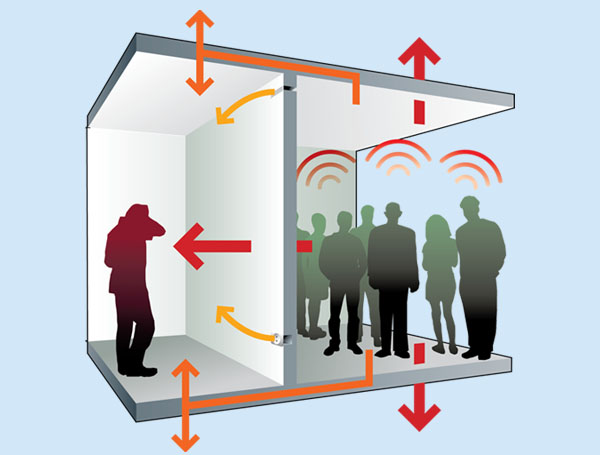
Why you should pick AF Acoustics for your sound testing
Our sound testing experts and engineers have worked with various homes and businesses in Upton. Our clients refer us to others because of the following benefits of working with us.
Sound testing experience of over 15 years
With more than 15 years of experience, we have a deep knowledge of our customers’ industry and provide actionable strong advice tailored to their needs. We also have a track record of providing superior acoustic services to our customers (home and business owners) in the UK in small and large projects, giving them astounding value for their money.
Competitive prices
To ensure all clients in Upton can afford superior quality sound insulation testing, we offer some of the most competitive rates you can both in and outside Upton. If in doubt, contact us now for a free no-obligation quote.
Fast and efficient consultancy
We will listen to your wishes, provide you sturdy solutions and deliver acoustic consultancy through our expertise. When you reach out to us for professional guidance, we make it a priority and deliver accurate answers fast. We recommend effective solutions that are most in line with your current and long-term needs.
Test dates that are adaptable
Our test date options let you pick what will suit your schedule because your comfort is essential to us. If you want to schedule sound insulation testing in Upton, phone or email us immediately.
Next day reporting
When you get your sound test report fast, you’re able to take corrective action. We try to issue reports on the next working day no matter how large or complex the project. That way, you can take immediate action on the recommendations given. Our reports are thorough and cover all the important issues.
AF Acoustics sound testing services
AF Acoustics offer a variety of complete acoustic slutions to clients all over the Uk, Contact us now for more information on how we can assist you with your acoustics requirements.
Impact and airborne tests for floors
These are performed on floors and/or ceilings between units. Impact testing evaluates how much the sound flowing from one partition to another through party floors via impact is. Impact and airborne testing is undertaken between party floors.
Approved Document E test
AF Acoustics sound testing adheres to ADE which stipulates information bearing on the sound resistance and performance of a property. The impact sound test of new dwellings should be 62dB L’nTw or less and airborne sound insulation 45dB DnTw+Ctr or more while impact results for reconstructed properties should be 64dB L’nTw and airborne sound insulation 43dB DnTw+Ctr or more.
Sound insulation test
With our professional and highly skilled expertise, we are willing to work with our clients to help them get a pass certificate in every situation. In new properties, an airborne and impact test will help you guarantee the building meets the requirements of greater than 45dB DnTw+Ctr and less than 62dB L’nTw. We regularly provide consultations for project managers and developers from the very start of developments, ensuring peace of mind when it comes time to having a sound test. Call or email us now for more details on our sound insulation testing services and for a quotation to be sent to you, free of charge.
BB93 Acoustic Design testing in Schools
Building Bulletin 93 (BB93) describes the minimum requirement for the acoustics of a school building. It also stipulates how a school can conform to Building Regulations. If building a new school in Upton, we can test the school to check if it meets the requirements of BB93.
Acoustic plan details
We provide acoustic layout services and consultancy for a huge range of building types and sizes. Our experience and expertise enables us to create bespoke solutions and understand diverse acoustic products. As a result, we’re able to provide targeted solutions to the demands of the project.
Getting advice on the acoustics of a development as early as possible is crucial. AF Acoustics can enable you to do that by advising you on the appropriate acoustic requirements of your property very early in the building process and recommending what to do to fulfil them.
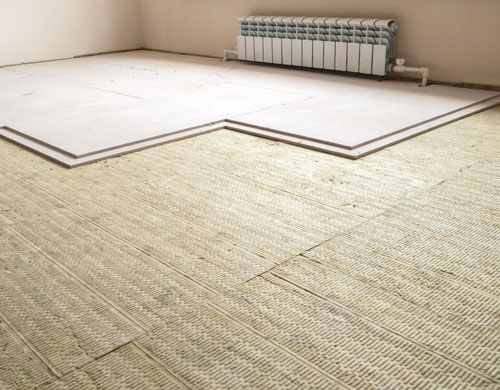
We are able to help with:
Acoustic detail plan for architects associated with advancements on residences adhering to ADE, BS8233, etc. Detail designs for the health, educational and commercial projects in order to meet up with the necessary requirements. Construction designs and specifications for sound control in residential areas and other noise sensitive developments. Increasing sound through public enterprise and sound reinforcement systems in conference rooms, halls, lecture theatres and the like.
Get a sound insulation testing quotation by contacting our experts
At AF Acoustics, we are an independent acoustic consultancy. Our work embraces acoustic surveys, acoustic design and investigation work in the fields of planning and noise, architectural and building acoustics, the monitoring and control of vibrations and air tightness testing. We will give you sound advice and guidance no matter who you are or the kind of project you have. To get an accurate quotation, either call us or email info@af-acoustics.com
We would like to know the following
When calling or emailing us please provide the following data
Location of property
Where is your development situated in Upton
Number of dwellings in the building
Tell us how many dwellings you have in the property.
How many storeys are there?
For the right calculation of your quotation, tell us how many levels are in your building.
Dwellings configuration per floor
This will also be needed to determine scope of the testing and provide an accurate quote
Kind of property
Knowing the kind of building is essential because it helps identify the type of test that will be conducted.
New construction or refurbished building
The testing requirement for new builds and conversion projects are different. We will need this information to determine what standard the testing ought to follow. With this information, we can easily provide you with an accurate and competitive quote on your project in little time.
Sound Insulation Testing Regulations
Get more credits for Code for Sustainable Homes and EcoHomes environmental assessment project by taking a sound insulation test which are aligned with approved document E building regulations rules.
Sound resistance: approved document of building regulations (England and Wales)
Our certified engineers can come to your building whenever it might suit you to undertake sound insulation testing to Part E of Building Regulations adherence, recognised by Building Control.
Scotland Standard division for properties
Section 5.1 of the Scottish Building Standards explicitly describes expected energy performance of dwellings. It states, “Every building must be designed and constructed in such a way that each wall and floor separating one dwelling from another, or one dwelling from another part of the building, or one dwelling from a building other than a dwelling, will limit the transmission of noise to the dwelling to a level that will not threaten the health of the occupants or inconvenience them in the course of normal domestic activities.” Tests should be taken at the completion of the building, using procedures given in annex 5.C. of the Scottish Standards. These standards don’t apply to detached structures that have access only for maintenance or are to used only by the occupants who live below.
How to get a pass certificate for your sound test
The most efficient way to make sure you pass sound insulation test is to have a plan that puts sound insulation into consideration from the begining. You don’t have to spend too much for this and it will save you money in the long run, ensuring you don’t pay remedial or re-test expenses. We offer design services to enable separating walls and floors with good sound insulation to meet the requirements of ADE, 2003. The degree of guidance you require can vary, from site visits and comprehensive design reports, to simpler initial testing to know the starting point for construction. The following criteria should be followed to provide you with the best chance of passing your sound test: All windows and door have been fixed and are functioning Skirting boards are fixed are sealed Light switches, light fittingsand plug sockets are properly fitted Our experienced acoustic consultants work with developers, contractors, architects and planners of all sizes from the early design stage to help minimise any potential issues right through to project completion, ensuring that all properties are compliant with Building Regulations Document E 2003.
Investigation and report certificates
To obtain a thorough evaluation of your building, we issue a report certificate within 24 working hours where possible. Our highly capable sound test engineers will give you a verbal result of the test, once the test is taken and proffer solutions to possible problems or future areas of concern. 6. Even before you get the certificate, you get the verbal results of the test. First, our completely skilled and competent sound insulation test engineers give you a verbal result at the site. They also offer advice on potential problems. Then the test report certificate is sent to you within 24 working hours, when feasible.
The way the results look
A sound insulation certificate will be issued whether the Sound Testing results and report indicate compliance with Part E of the Building Regulations or not. In the event of a wall or floor not achieving the Part E requirements, it may be necessary to carry out remedial works before having another sound test carried out. We can provide you with remedial design advice to help you achieve the Building Regulations requirements.
Sound Insulation FAQ’s
The minimum requirements depend on a variety of factors such as if the development is a new build or refurbished, whether the development is intended to be a permanent dwelling, or classified as “rooms of residential purposes” (e.g. hotels, student accommodation, etc).
New builds must achieve impact sound test results of no more than 62dB L’nTw and airborne sound insulation of no less than 45dB DnTw+Ctr. Converted properties must achieve impact results of 64dB L’nTw or lower and airborne sound insulation of no less than 43dB DnTw+Ctr.
Flanking sound (or flanking noise) is sound that transmits between spaces indirectly, going over or around, rather than directly through the main separating element. This can allow sound to transmit between spaces even though the main separating element itself provides good acoustic insulation. Engaging our services at an early stage allows us to check designs and add necessary measures to prevent this occurring after construction. In the worst cases, flanking can exceed the direct transmission and lead to a failed test, despite highly specified partitions.
In the case of impact sound, the building construction is caused to vibrate as a result of a physical impact, such as footsteps on floors or stairs. The resulting vibration is radiated into other rooms in the building.
We can provide preliminary results on the day of test. We strive to deliver next day reporting in all scenarios regardless the complexity or size of the project. The delivered report will be comprehensive and detailed, to ensure all relevant issues are covered. The best recommendations can also be sent in a separate report or email.
We can normally conduct up to a maximum of three sets of tests per day. One set is two airborne floor tests, two airborne wall tests and two impact floor sound tests.
When it comes to the acoustic tests, a full set of tests should take approximately 90 minutes.
The requirements of sound insulation testing are fully detailed in the Building Regulations Approved Document, available here [link], under Part E (2003).
This requires all residential buildings to be tested when they involve walls and/or floors. These are known as party elements.
Assuming no tests are failed, building control bodies should stipulate at least one set of tests for every ten dwelling-houses, flats or rooms for residential purposes in a group or sub-group.
New builds must achieve impact sound test results of no more than 62dB L’nTw and airborne sound insulation of no less than 45dB DnTw+Ctr. Converted properties must achieve impact results of 64dB L’nTw or lower and airborne sound insulation of no less than 43dB DnTw+Ctr.
We recommend that if possible, we are contacted before a build to provide a design review and advice on how to meet quality standards.
Should the test fail, we can offer advice on how to improve the sound insulation. We have consulted on hundreds of building projects in the past, and have ensured all of them have met the building regulations. If a sound insulation test fails, we can give remindial advice to ensure the tests passes later.
We understand that most clients would prefer testing to take place as soon as possible. Once you get in touch we will schedule the test at the earliest available opportunity.
You can call us today to set up an appointment for sound insulation testing. Our scheduling is flexible so that you can get the service you need at your convenience.
Ideally, a test should be carried out as early as possible as problems are more difficult to fix the further along you are. Where possible, it’s recommended that testing is carried out before kitchens or bathrooms are installed. The minimum that we require to be able to carry out a test is:
- All doors, windows and seals should be fully fitted and closable
- All electrical fittings should be fitted and working
- 240V mains power must be available on-site in all rooms
- Gaps in walls and floors should be fully sealed
- All walls and ceilings should be plastered
- There should be no holes remaining in floors or ceilings
- Testers will require access to all rooms on all levels
Pre-completion sound testing is a building regulation requirement for all purpose built & “formed by material change of use” (i.e. refurbished) properties since 2003. Sound testing is undertaken in a percentage of properties in each development to ensure that the separating walls & floors between habitable rooms of neighbouring properties meet the minimum requirements as defined by Approved Document E, commonly referred to as ADE.
From 2003, Approved Document E states that all new UK builds must undergo pre-completion sound insulation testing. New builds must achieve impact sound test results of no more than 62dB L’nTw and airborne sound loss of no less than 45dB DnTw+Ctr. Converted properties must achieve impact results of 64dB L’nTw or lower and airborne sound loss of no less than 43dB DnTw+Ctr. Approved Document E sets out details pertaining to the resistance to the passage of sound.
This Approved Document, as part of UK Building Regulations helps to ensure that newly built or converted houses and residencies, flats and residential spaces and other relevant buildings are constructed to minimum standards that provide ‘reasonable resistance to sound from other parts of the same building and from adjacent buildings.’ All of our tests are fully compliant with Approved Document E and our expert team have been carrying out compliant tests for many years, for thousands of satisfied customers throughout the UK.
We understand the sectors our clients work in. Our advice is not only technically robust but also practical and helpful to our client’s particular situation. At AF Acoustics, we always look at the bigger picture and work towards the ultimate development goal.
In order to provide you best solutions, we will listen to your needs, present you with robust solutions and deliver acoustic consultancy through our considerable experience. Our ever-expanding knowledge-base allows us to provide cost-effective and streamlined solutions.
Our consultants are very experienced and have a proven track record on both small scale projects and major projects. As we are a lean and small company, we have lower overheads and therefore offer exceptional value for money.
Airborne sound (or airborne noise) is sound that is transmitted through the air. Airborne Sound Insulation is the insulation against noise originating in air, e.g. voices, music, motor traffic, wind. The greater the airborne sound insulation between two rooms, the lower the resulting sound level in the receiving room.
This is unlike Impact Sound Insulation that protects against noise originating directly on a structure by blows or vibration e.g. footsteps above, furniture being moved, drilling and hammering the structure.

